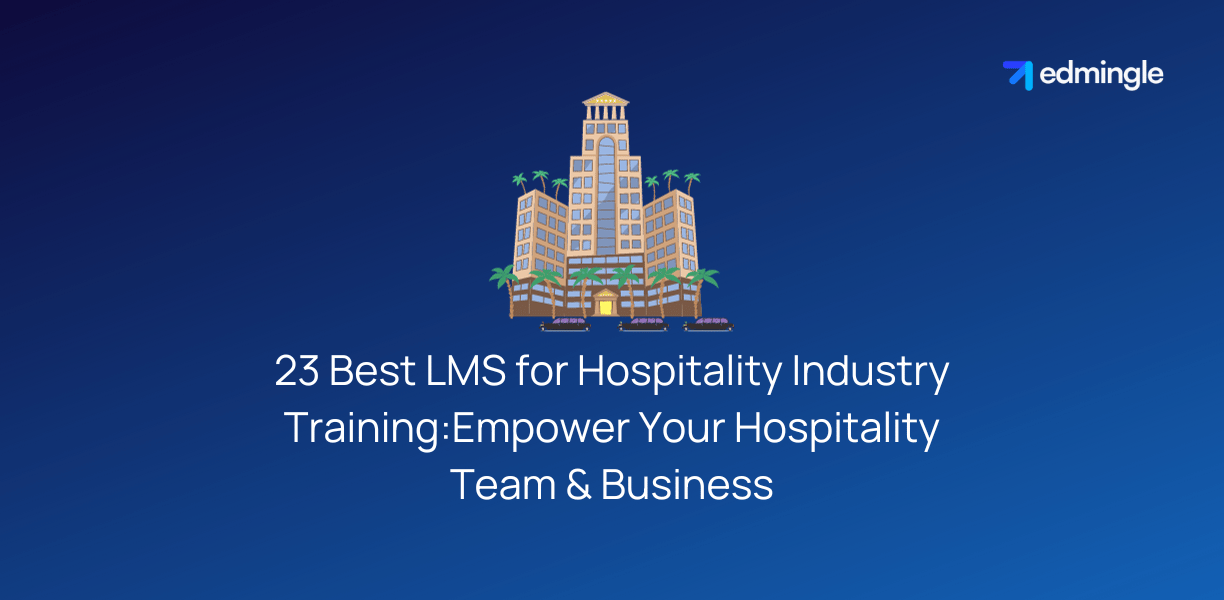
Are you looking to elevate your hospitality team’s performance and drive your business towards unmatched success? If yes, you’re at the right place.
An LMS for hospitality can be the game-changer for you. The hospitality sector has a dynamic nature; requiring constant adaptation and learning.
From mastering the art of customer service to keeping up with the latest industry trends, the right learning can make a significant difference.
This is where learning management systems come in – offering a flexible, efficient, and interactive approach to training and developing hospitality employees.
We’ve curated a list of the 23 best hospitality learning management system in 2023. And in this comprehensive guide, we’ll dive in-depth on the topic.
What is an LMS for Hospitality?
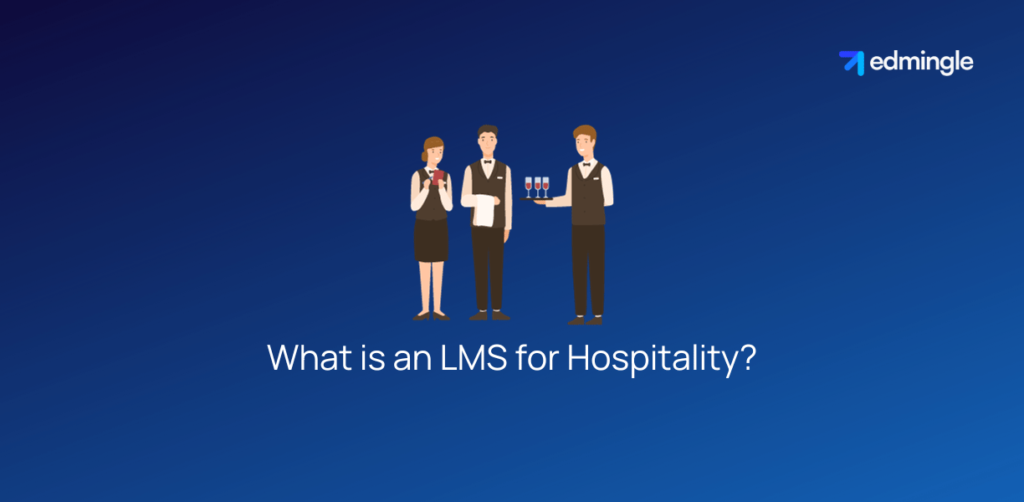
An LMS for hospitality is a specialized digital platform designed to streamline and enhance the training and development processes within the industry.
- It’s tailored to meet the unique needs of hotels, restaurants, and other service-oriented businesses. These systems offer a range of authoring tools & resources for delivering, tracking, and managing learning programs for their staff.
- They facilitate interactive learning experiences, enabling hospitality staff to acquire and refine skills crucial for customer service, operational efficiency, and compliance with industry standards.
- By providing a flexible and accessible learning environment, a learning management system helps a hospitality business/company maintain high service standards, adapt to industry changes.
It empowers your staff with the skills and knowledge they need to excel, ensuring that your guests receive the best possible experience.
But why should you pay attention to an LMS?
Simply put, the right LMS can transform your team from good to exceptional.
More than just a tool, a hospitality LMS is a gateway to operational excellence and enhanced customer satisfaction.
Since we’ve talked a lot about operational excellence & efficiency, you’ll be thrilled to know that Edmingle reduces your operational costs by 20%.
Key Features of an LMS for Hospitality
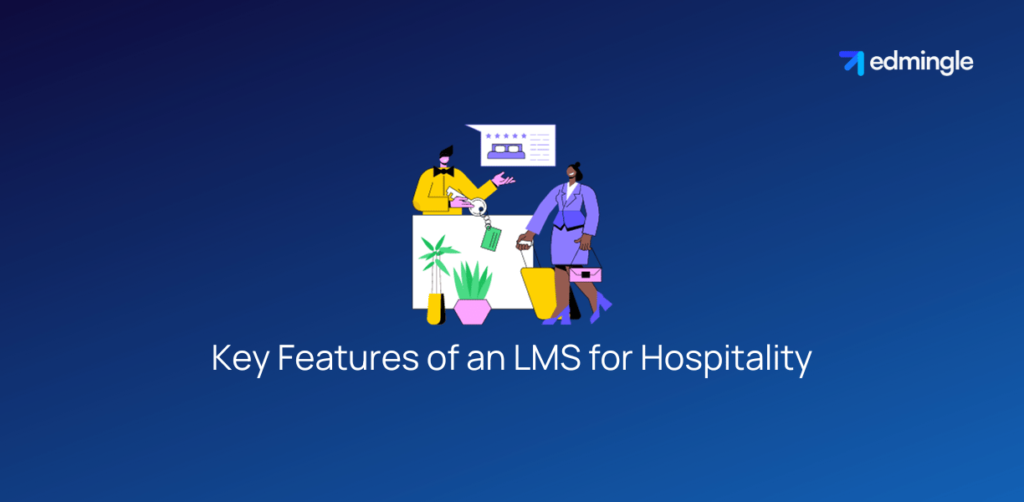
In the fast-paced and ever-evolving hospitality industry, a Learning Management System (LMS) plays a pivotal role. It ensures staff proficiency and service excellence.
An effective LMS for Hospitality is not just a tool but a comprehensive solution that addresses the unique challenges and requirements of this service-oriented sector.
Here are some common features that you can expect to find:
- Customizable Course Creation: These systems offer the ability to create and tailor courses specific to the needs of the hospitality industry, such as customer service excellence, health and safety protocols, and culinary skills.
- Interactive Learning Modules: To engage learners, these platforms often include interactive elements like videos, interactive scenarios, and gamification, making learning both enjoyable and effective.
- Mobile Accessibility: Recognizing the on-the-go nature of hospitality work, many LMS platforms are mobile-friendly, allowing staff to access materials from anywhere, at any time.
- Tracking and Reporting: An essential feature of LMSs, robust tracking and reporting capabilities allow managers to monitor progress, assess learning outcomes, and identify areas for further improvement.
- Compliance Management: With the hospitality industry subject to numerous regulations, these systems often include features to ensure compliance with health, safety, and industry standards.
- Multilingual Support: Catering to a diverse workforce, a hospitality LMS typically supports multiple languages, ensuring that all staff can learn in their preferred language.
- Real-time Feedback and Assessment: Power of feedback and assessments help in reinforcing learning and identifying areas where additional training may be needed.
- Integration Capabilities: To streamline operations, these systems can often integrate with other HR and operational hospitality software.
- Customer Service Focus: Specialized modules focus on enhancing customer service skills, which are paramount in the hospitality industry.
- Scalability: As businesses grow, a good LMS can scale up to accommodate more users, online training courses, and data storage needs.
Multilingual support means you can train your staff on various languages so as to smoothen the customer experience. To know more on this, read our blog on LMS for Language Teaching.
By leveraging these features, hospitality businesses can ensure that their teams are well-equipped to provide exceptional guest experiences.
Why use an LMS to Provide Hospitality Training?
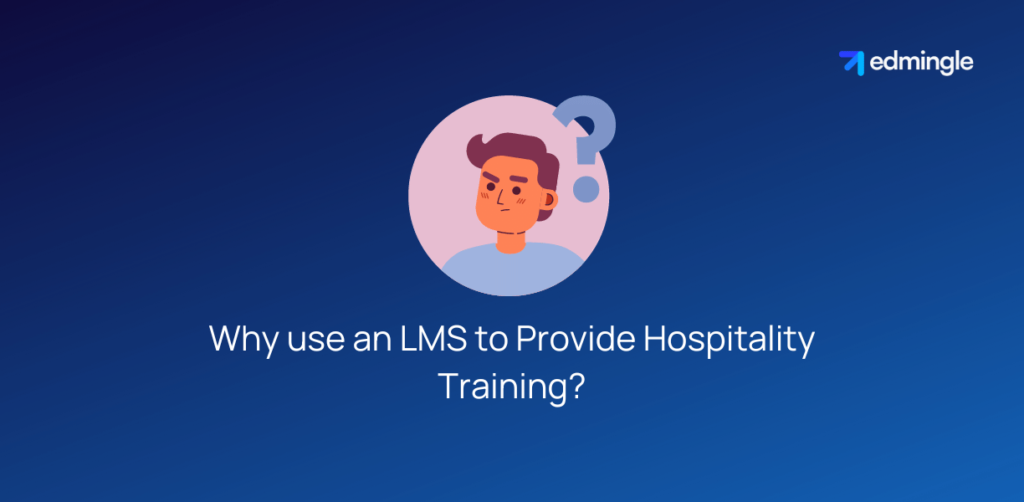
An LMS is highly beneficial for the hospitality industry due to its ability to deliver holistic & standardized learning across various levels of staff. Thereby, ensuring consistent service quality, which is crucial in the hospitality sector.
Its flexibility allows hospitality staff to access materials at their convenience, accommodating the irregular schedules typical in this industry.
Additionally, an LMS can track progress and performance, enabling tailored knowledge delivery that addresses specific needs or skills gaps.
Why is Training Necessary for Hospitality Staff?
Training is essential for hospitality staff as it ensures they possess the necessary skills and knowledge to provide exceptional customer service, which is the cornerstone of the hospitality industry.
| Well-trained staff can handle various situations, from routine tasks to unexpected challenges, with professionalism and efficiency. |
| Training also keeps staff updated on the latest industry standards and practices, ensuring compliance with safety and health regulations. |
| Additionally, it boosts employee confidence and job satisfaction, which translates into a better guest experience. |
In a sector where the quality of service directly impacts business success, investing in staff training is not just beneficial but vital.
Learn more about the benefits of an LMS for Employee Training.
Challenges in Training Hospitality Staff
Training hospitality staff presents several challenges, primarily due to the diverse and dynamic nature of the industry. Some of the major ones are listed below:
| Firstly, the high employee turnover rate in hospitality means there’s a constant need to train new employees, which can strain resources. |
| Secondly, the irregular and long working hours typical in hospitality make scheduling training sessions difficult, as it must be done without disrupting daily operations. |
| Additionally, the wide range of roles within a hotel or restaurant requires tailored training for each position, adding complexity to the training process. |
| Language barriers and varying educational backgrounds among staff can also make it challenging to deliver effective training that’s accessible to all. |
| Finally, keeping training content up-to-date with the rapidly evolving industry standards and customer expectations is another significant challenge. |
8 Benefits of an LMS for Hospitality Industry
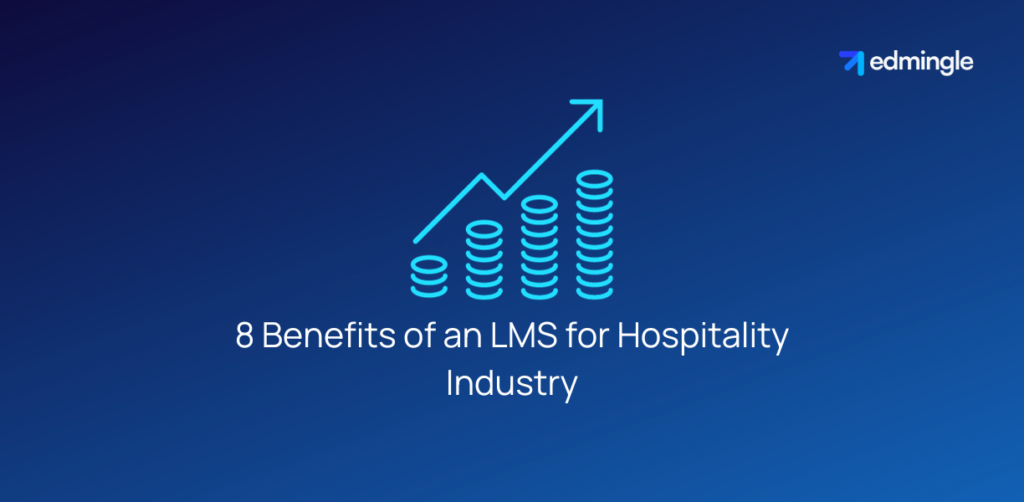
An LMS (Learning Management System) offers numerous benefits for the hospitality industry. The 8 major ones are:
- Consistent Training Across Multiple Locations: An Edmingle-like LMS allows for uniform training materials and standards across different batches & locations, ensuring a consistent level of service quality.
- Flexible Learning Schedules: Given the varying shifts and busy schedules in hospitality, an LMS enables staff to access training at their convenience, leading to better employee engagement and completion rates.
- Cost-Effectiveness: Online training through an LMS reduces the need for physical training materials and on-site trainers, leading to significant cost savings.
- Tracking and Reporting: An LMS provides tools to track employee progress, identify areas for improvement, and ensure compliance with industry standards and regulations.
- Customizable Content: Training content can be easily customized to cater to the specific needs of different roles within the hospitality industry, from front desk operations to housekeeping.
- Interactive and Engaging Learning: Modern LMS platforms support interactive content like video and quiz, making the learning experience more engaging and effective.
- Scalability: As the business grows, an LMS can easily scale to accommodate more users and updated training content, making it a long-term solution.
- Rapid Response to Industry Changes: The hospitality industry is dynamic, and an LMS allows for quick updates to training materials to reflect changes in regulations, technology, or customer service trends.
By leveraging an LMS, hospitality businesses can improve their training processes, enhance employee performance, and ultimately, elevate the guest experience.
5 Ways LMS Platforms will Revolutionize the Hospitality & Tourism Industry
In the age of e-learning, LMSs are driving the future of education to its zenith. In this section, we’ll look at the special benefits these platforms bring to the table for this industry.
| Enhanced Customer Service Training | LMS platforms will revolutionize customer service training in the hospitality and tourism industry by providing immersive and interactive training modules. This approach helps staff better understand and meet the diverse needs of guests, leading to improved customer satisfaction and loyalty. |
| Streamlined Compliance Training | With ever-changing health and safety regulations, especially in post-pandemic scenarios, LMS platforms can quickly update and disseminate compliance-related content. This ensures all staff are up-to-date with the latest guidelines, reducing the risk of non-compliance and enhancing overall safety standards. |
| Personalized Learning Paths | LMS platforms can tailor training programs to individual employee roles and career aspirations. This personalized approach not only increases engagement and motivation among staff but also equips them with specific skills needed for career advancement within the industry. |
| Real-time Feedback and Analytics | LMS platforms offer real-time feedback and analytics on staff performance and training progress. This data-driven approach enables managers to identify skill gaps, customize further training, and optimize workforce productivity, directly impacting the quality of service. |
| Global Training Consistency | For multinational hospitality and tourism companies, LMS platforms provide a uniform training experience across all locations. This global consistency ensures that regardless of geographic location, every employee adheres to the same high standards of service, maintaining the brand’s reputation worldwide. |
By integrating these innovative approaches, LMS platforms are set to significantly elevate the operational efficiency, service quality, and staff satisfaction in the hospitality and tourism industry.
How can Hospitality Businesses Choose the Right LMS?
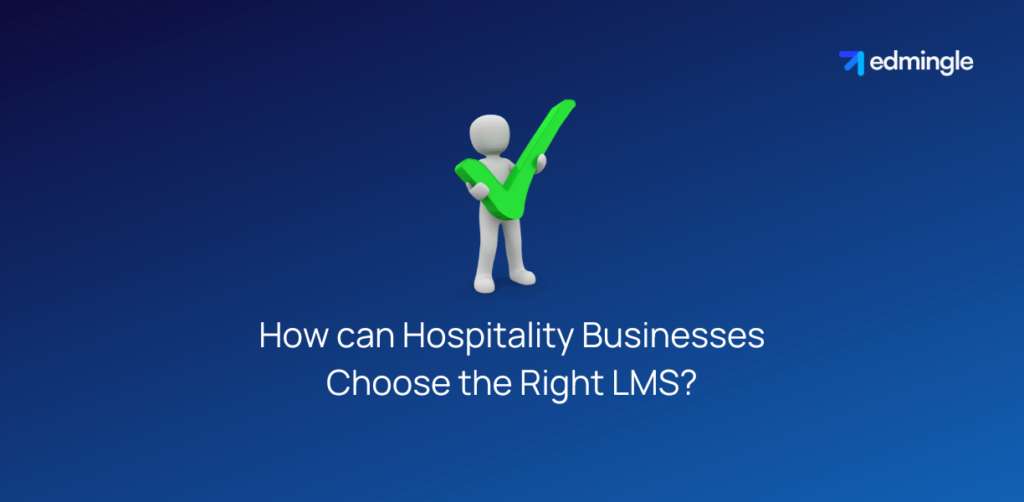
Choosing the right LMS for a hospitality business involves several key considerations.
First, it’s crucial to assess the specific training needs of the business, including the types of online training courses required (e.g., customer service, compliance, technical skills) and the preferred learning formats (videos, interactive content, etc.).
Furthermore, the LMS should be user-friendly and accessible across various devices, accommodating the on-the-go nature of hospitality work.
Scalability is essential; the system should grow with the business and handle increased loads without performance issues.
Integration capabilities are also important, as the LMS should seamlessly integrate with existing systems (like HR software) for efficient data management.
Additionally, the LMS should offer robust tracking features with reports to monitor employee progress and identify training gaps.
Lastly, cost-effectiveness is a critical factor, ensuring the chosen solution offers good value without compromising on essential features.
Hospitality businesses should ideally trial a few options or seek demos to make an informed decision that aligns with their specific training requirements and organizational goals.
To help with the selecting process, our article on 6 Steps to Selecting the Perfect SaaS LMS for Your Business might be super helpful.
23 Best LMS for Hospitality in 2023
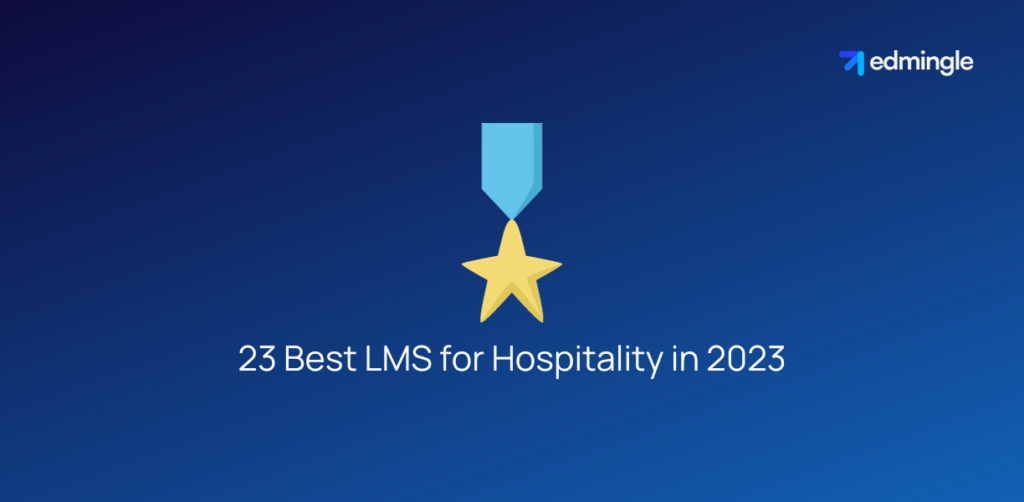
The hospitality industry is rapidly evolving. And the need for effective and efficient training has never been more crucial. A learning management system can be a game-changer in this regard.
As we step into 2023, let’s explore the top 23 LMS platforms that are making waves in the hospitality sector.
1. Edmingle
A standout for its user-friendly interface, Edmingle offers a wide range of features; perfect for the dynamic needs of hospitality training. Its mobile accessibility ensures training on the go, fitting perfectly into the busy schedules of hospitality professionals.
Some highlight features of this robust SaaS LMS platform are:
- 100% white-labelling in website, mobile apps & landing pages.
- Highly scalable & flexible than most other LMSs in the market.
- Exceptional approach to customer support & service.
- Training delivery via offline, online & hybrid models.
Trusted by more than 5000 training providers and leaders like McGraw Hill, Aditya Birla Education Academy, MIT SDE and many more, Edmingle ranks #1 in the list of Best LMSs of 2023 by SoftwareSuggest.
2. Tovuti
Tovuti shines with its engaging learning environment. Featuring interactive content and gamification, it’s designed to keep learners motivated. The platform also offers robust reporting tools, making it a top choice for managers seeking to track training progress.
3. Absorb LMS
Known for its scalability, Absorb LMS is ideal for hospitality businesses of all sizes. It offers a sleek and intuitive interface, with features that support both online and offline training – a versatile choice for a diverse workforce.
4. eloomi
Eloomi combines ease of use with a powerful set of tools to manage and deliver training. Its strength lies in customization, allowing businesses to tailor the learning experience to their specific needs.
5. Trakstar Learn
Trakstar Learn is appreciated for its comprehensive learning paths that guide employees through their training journey. The platform also integrates well with other HR systems, streamlining the training process.
6. TalentLMS
TalentLMS is a favorite for its flexibility and simplicity. It’s an ideal solution for smaller businesses in the hospitality industry looking for a cost-effective yet robust LMS.
7. Continu
Continu offers a modern and clean interface with a focus on social learning and collaboration. Its features encourage interaction among learners, making training a more engaging experience.
8. Litmos
Litmos is renowned for its enterprise-level capabilities. It offers extensive course libraries and is particularly strong in compliance training, a critical aspect in hospitality.
9. Seek LMS
Seek LMS stands out for its AI-driven recommendations that personalize the learning experience. This platform is all about delivering relevant, impactful training to each individual.
10. Docebo
Docebo is known for its AI-powered learning platform that makes training intuitive and effective. Its ability to curate content based on learner needs makes it a top pick.
11. Mykademy
Mykademy offers a balance of simplicity and powerful features. Its cloud-based system ensures accessibility and reliability, essential for the fast-paced hospitality industry.
12. eduMe
Focusing on mobile-first learning, eduMe is perfect for on-the-go training. Its microlearning approach breaks down complex topics into digestible chunks, ideal for quick learning sessions.
13. Green LMS
A SaaS-based complete LXP, i.e an AI-driven peer learning experience platform. Green LMS brings a unique approach for businesses in the hospitality industry.
14. Accord LMS
Accord LMS excels in delivering personalized learning experiences. Its adaptive learning paths ensure that each employee’s training is as effective as possible.
15. Skyprep
Skyprep combines ease of use with a comprehensive set of features. Its strong customer support and user-friendly interface make it a go-to choice for many in the hospitality sector.
16. Learning Lab LMS
Innovative and interactive, Learning Lab LMS focuses on experiential learning. It’s an excellent choice for hands-on training that simulates real-world hospitality scenarios.
17. MindScroll
MindScroll offers a seamless learning experience with its intuitive design and robust functionality. It’s particularly adept at handling large volumes of content, making it suitable for extensive training programs.
18. Open LMS
As an open-source LMS platform, Open LMS provides unparalleled flexibility and customization options. It’s ideal for businesses looking to tailor their LMS to their exact specifications.
19. CPL Learning
CPL Learning is focused specifically on the hospitality and retail sectors. Its industry-specific content and features make it a highly relevant choice.
20. ProProfs
ProProfs is known for its simplicity and an extensive library of ready-to-use materials. It’s a quick and effective solution for businesses looking to implement training with minimal setup.
21. Totara
Totara is celebrated for its emphasis on collaborative learning and performance management. It’s a comprehensive solution that aligns learning with business objectives.
22. Maple LMS
Maple LMS stands out for its advanced analytics and reporting capabilities. These insights help businesses fine-tune their training strategies for optimal results.
23. Agilsys
Agilsys is designed with the hospitality industry’s specific needs in mind. It stands out for its robust integration capabilities, allowing seamless synchronization with other operational systems.
Each of these LMS platforms brings unique strengths to the table, catering to the diverse needs of the hospitality industry.
Conclusion
The hospitality industry is undergoing a significant transformation, driven by the evolving demands of customer service and the rapid integration of technology.
As we’ve explored in this blog, learning management systems are at the forefront of this change, offering a multitude of solutions tailored to the unique challenges and needs of this dynamic sector.
The future of hospitality training is bright, and it’s digital. Embrace the change, and watch your business and your team thrive.
FAQs on LMS for Hospitality
What is an LMS and how is it beneficial for the hospitality industry?
An LMS is a software platform designed to create, deliver, and track training programs. In the hospitality industry, an LMS is particularly beneficial for standardizing training across multiple locations, offering flexible learning schedules, tracking employee progress, and providing cost-effective and scalable training solutions.
Can an LMS accommodate the varying schedules of hospitality staff?
Yes, one of the key advantages of an LMS is its flexibility. It allows staff to access training materials at their convenience, fitting into their often irregular and busy schedules. This accessibility ensures ongoing training without disrupting daily operations.
How does an LMS ensure the quality of training in the hospitality industry?
An LMS ensures training quality by providing consistent, up-to-date, and standardized content across all levels of staff. It also offers interactive and engaging learning materials, which enhance the learning experience. Furthermore, its tracking and reporting features allow managers to monitor progress and identify areas for improvement.
Is it cost-effective to implement an LMS in a small or medium-sized hospitality business?
Absolutely. An LMS can be a cost-effective solution for businesses of all sizes. It reduces the need for physical training materials and on-site trainers. Moreover, many LMS platforms offer scalable solutions, meaning you only pay for what you need, which is particularly beneficial for smaller businesses.
How do I choose the right LMS for my hospitality business?
Choosing the right LMS involves assessing your specific training needs, considering the ease of use and accessibility of the platform, its scalability, integration capabilities with existing systems, and its tracking and reporting features. It’s also important to consider the cost and to trial a few options before making a decision.


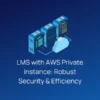



Leave a Reply